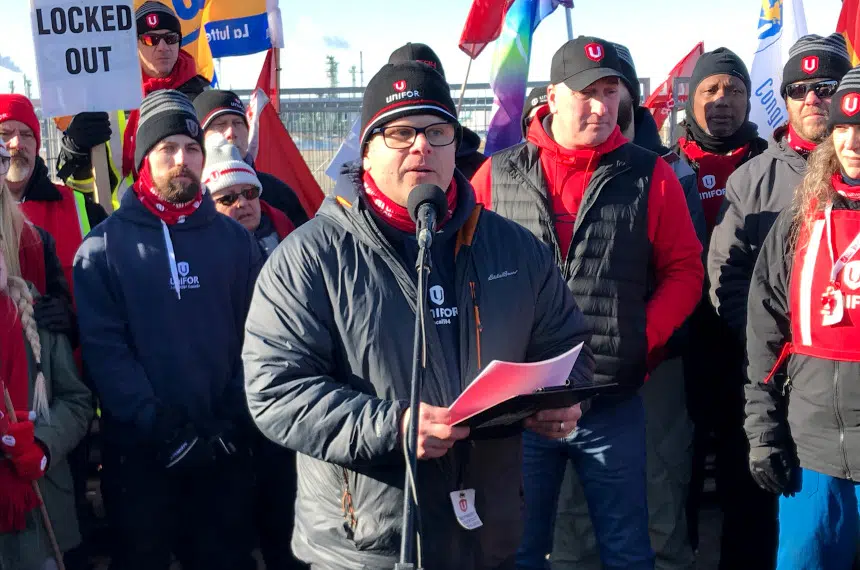The special mediator appointed by the provincial government will start his work this week, trying to close the gap between the Co-op refinery and Unifor. But before that happens, Unifor laid out its bargaining position and version of events from the past few weeks, saying it wants to clear up misinformation.
When contacted for comment on Unifor’s claims, a spokesperson for the refinery said these are complex issues to discuss and they want to leave bargaining for the bargaining table.
From the beginning, it seems the dispute has revolved around the workers’ pensions. The refinery’s website about the dispute says it’s just giving the workers a choice between moving to a defined contribution plan or staying in the current defined benefit plan but starting to pay into it.
However, Carla McCrie with Unifor’s local 594, said there are some changes to the defined benefit plan as well-she said the refinery wants to lower the multiplier in the formula which decides how much the employee gets, and to no longer have the amount indexed to the rate of inflation.
“This would amount to a 10 to 20 per cent decrease in the value of my pension, and it doesn’t account for any rises in the cost of living, so the longer a retiree lives the poorer they get,” explained McCrie.
According to McCrie, the union offered to contribute six per cent to the defined benefit pensions at the January 24 meeting, if the company agreed to no further changes in the next bargaining, except for those that might occur in the rest of the national industry. That, along with an offer to jointly apply for some relief in pension payments, would save the company $20 million a year on pension costs according to McCrie.
However, McCrie said the refinery had no interest, that day.
“If that’s what we’re after here, that the pension’s too expensive, then how can you turn your nose up when we’re offering you $20 million annually – every year – $20 million you save in pensions, and they have no counter offer to that,” said McCrie.
According to McCrie and local president Kevin Bittman, at that meeting, the refinery put back on the table a handful of concessions that had already been bargained away months before.
These include things like a proposal which would allow any work to do another worker’s job, another which would remove 36 master operators from the Unifor bargaining unit, and another which would remove all 14 job descriptions from the maintenance department-McCrie said all these things have safety implications.
The company also wants to get rid of an employee savings plan, and move it to a performance plan which would be a bonus based on how well the company is doing, however McCrie said they didn’t get any details on that and it could be taken away at any time.
“Out of all the proposals that the Co-op refinery brought back to the table, the worst is Co-op’s proposal, Letter of Understanding 58, that would remove the minimum complement (requirement) of 256 maintenance workers,” explained McCrie.
That would allow the refinery to get rid of all those jobs if it wanted to, according to McCrie. She asked how they refinery could expect the union members to vote to get rid of jobs, and in a time of record profits for the company.
“They make it sound like they are giving us something, but really what they’re giving us is taking away benefits that we have already,” said Bittman.
With all of the changes proposed by the refinery are put together, McCrie said the average employee would lose about $18,000 a year.
Looking at what happened at the meeting in January, Bittman said he doesn’t think the refinery wants a deal.
“When we sat down with the Co-op on that Friday they made sure there was no deal to be had. They added major concessions that took away 40 per cent of our membership, including taking away job duties that we have defined in the collective agreement … they added five or six major concessions that they knew would be a no-go – they attacked union principles right off the bat,” said Bittman.
According to Bittman, the union is asking for, essentially, one thing-the national pattern, which is pay increases of 11.75 per cent which has been agreed to by employers and companies across the industry. Bittman said it’s the same term, wage increases, and language.
Many critics of the union look at their average wages and benefits and some have said in person and on social media that the union is being greedy, that most people don’t have it that good so they should just take the deal. When asked about that, Bittman said he could find someone without a pension or someone who makes less than he does.
“Under that premise everybody would just work for minimum wage because somebody is always lower than somebody,” said Bittman.
Seeing all this together and with his accusations that the refinery doesn’t want to come to a deal, Bittman said he’s only cautiously optimistic when it comes mediation. The special mediator is set to start work on Tuesday and is scheduled to last 20 days.











